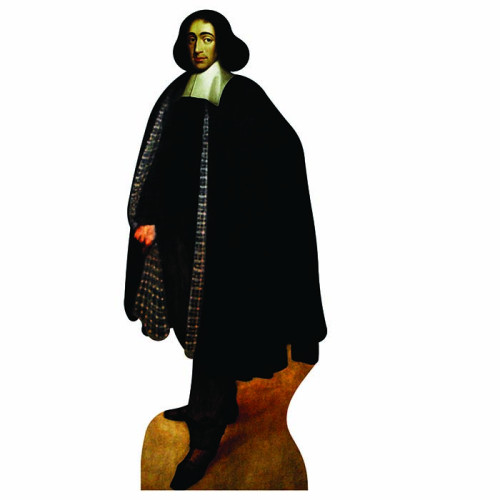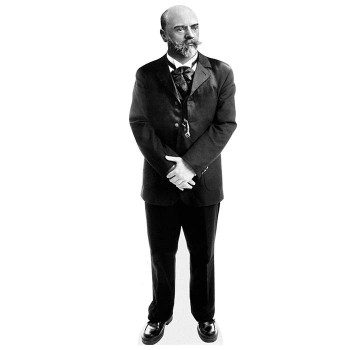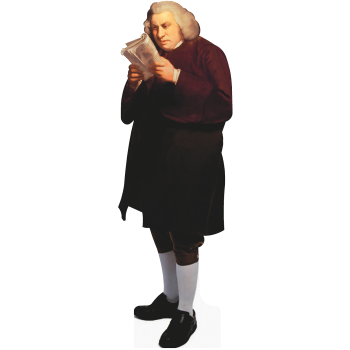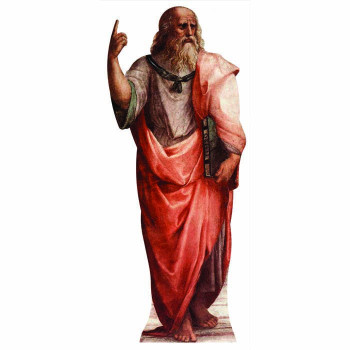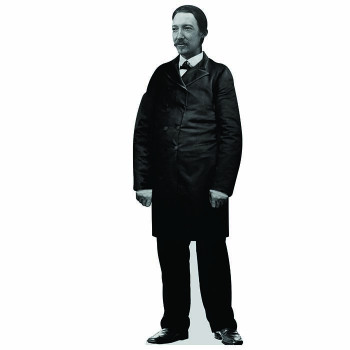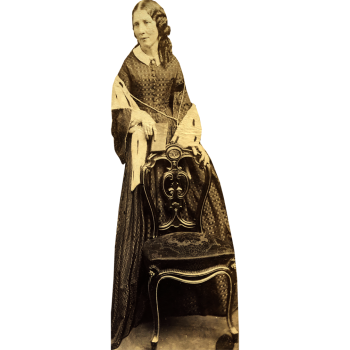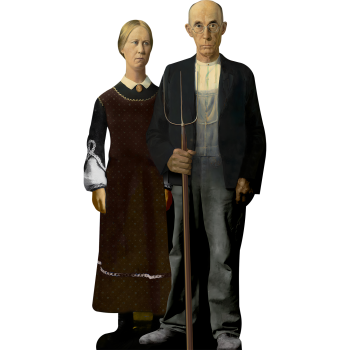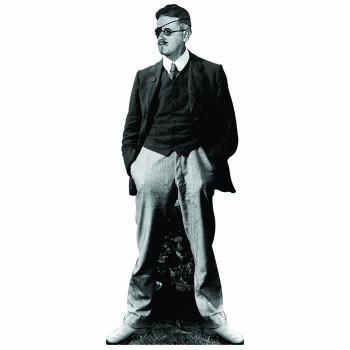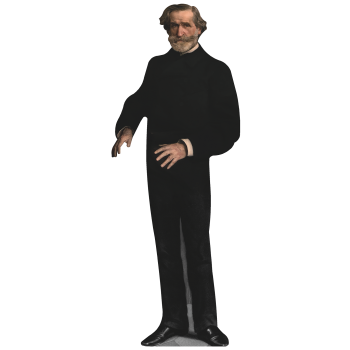BENEDICT DE SPINOZA CARDBOARD CUTOUT
-
$0.00
Available Options
64 x 27 inches. Our cardboard cutout of Benedict de Spinoza. All cardboard cutouts come folded and have an easel attached to the back to be self-standing. Items are printed and produced to order. Printing and processing takes up to 5 business days plus shipping time.
Introduction to Benedict de Spinoza
Celebrate the legacy of one of the most influential philosophers of the Enlightenment with our lifesize cardboard cutout of Benedict de Spinoza. Perfect for philosophical discussions, educational events, or as an inspiring addition to your home or office, this cutout captures the contemplative presence of Benedict de Spinoza, reflecting his profound impact on philosophy and rational thought.
Background of Benedict de Spinoza
Benedict de Spinoza, also known as Baruch Spinoza, was born on November 24, 1632, in Amsterdam, Netherlands, to a family of Portuguese-Jewish origin. Raised in the Jewish community of Amsterdam, Spinoza received a traditional Jewish education, studying religious texts, philosophy, and science. However, his unconventional views and critical thinking led to his excommunication from the Jewish community in 1656.
Despite this, Spinoza continued his intellectual pursuits, supporting himself through lens grinding and developing his philosophical ideas. He corresponded with some of the leading thinkers of his time and became known for his radical views on religion, politics, and ethics.
Spinoza's most significant work, "Ethics," was published posthumously in 1677. Written in a geometric style, "Ethics" presents a rigorous philosophical system that addresses the nature of reality, human emotions, and the path to happiness. Central to Spinoza's philosophy is the concept of "God or Nature" (Deus sive Natura), which posits that God and the natural world are one and the same, rejecting the traditional notion of a personal, anthropomorphic deity.
Spinoza argued for the importance of reason and rationality in understanding the world and achieving human freedom. He believed that understanding the laws of nature leads to a deeper knowledge of God and promotes a life of virtue and contentment. His ideas on the unity of mind and body, the nature of substance, and the interdependence of all things were groundbreaking and controversial.
In addition to "Ethics," Spinoza wrote several other influential works, including "Theological-Political Treatise," which advocated for the separation of religion and state, freedom of thought, and democratic principles. His views on religious tolerance and political liberalism were ahead of his time and laid the groundwork for modern secular and democratic societies.
Spinoza's philosophical rigor and commitment to intellectual honesty made him a pivotal figure in the history of philosophy. He passed away on February 21, 1677, in The Hague, but his ideas continue to inspire and challenge thinkers today.
Cultural Impact of Benedict de Spinoza
Benedict de Spinoza's impact on philosophy and modern thought is profound and enduring. As one of the foremost rationalists of the Enlightenment, his ideas have shaped the development of Western philosophy, influencing a wide range of fields, including metaphysics, ethics, political theory, and theology.
Spinoza's concept of "God or Nature" challenged traditional religious views and promoted a pantheistic understanding of the divine, which has influenced subsequent philosophical and theological discussions. His rejection of supernatural explanations in favor of naturalistic and rational ones helped pave the way for the Enlightenment emphasis on reason and science.
"Ethics" is considered a masterpiece of philosophical literature, renowned for its systematic approach and depth of insight. Spinoza's ideas on the nature of reality, human emotions, and the pursuit of happiness continue to resonate with contemporary philosophers and scholars. His emphasis on understanding the natural world and human behavior through reason remains a cornerstone of modern philosophy.
Spinoza's advocacy for freedom of thought, religious tolerance, and the separation of religion and state has had a lasting impact on political theory and practice. His "Theological-Political Treatise" is often cited as a foundational text in the development of secular and liberal democratic principles. His ideas influenced later thinkers, including John Locke, Immanuel Kant, and Albert Einstein, who admired Spinoza's philosophical rigor and vision.
Spinoza's life and works are celebrated through numerous scholarly studies, publications, and conferences dedicated to his philosophy. His legacy is preserved in institutions such as the Spinoza House in Rijnsburg and the Spinoza Museum in The Hague, which attract visitors and scholars from around the world.
This cutout of Benedict de Spinoza celebrates his remarkable contributions and enduring legacy as a master philosopher. It serves as a tribute to his intellectual brilliance, his impact on the development of rational and secular thought, and his significant role in shaping the philosophical landscape of the Western world.
- Brand: Historical Cutouts
- Product Code:H79039
- Availability:In Stock
LEARN MORE ABOUT OUR AVAILABLE MATERIALS

LIFE SIZE HISTORICAL CUTOUTS
We have been the leading historical based cutout supplier for nearly 10 years. We have worked with many schools, museums, and colleges across the country to provide stunning graphics from hsitory. Historical Cutouts are available in 3 materials and come contour cut with an easel to be self standing. Click below to learn more about each material and our cutout process.
Learn More
LIFE SIZE HISTORICAL WALL DECALS
All of our historical figures are available as a life size wall decals. Vinyl wall decal orders come ready to apply with squeegie and instructions. Having trouble? Check out our how to youtube video. Our graphics are printed on tear resistant PhotoTex Vinyl using our high definition 4 color plus white printing process.
Learn More
HISTORICAL ACRYLIC CUTOUTS
Desktop Legends are a smaller version of our life size cutotus printed on 3/16th" acrylic. All of our historical cutouts are also available as a desktop legend. These acrylic statuettes come in two sizes, 8" and 12". If you would like to learn more please click below.
Learn MoreRELATED PRODUCTS
-
Antonin Dvorak Cardboard Cutout
66 x 21 inches. Our cardboard cutout of Antonin Dvorak. All cardboard cutouts come folded and have a..
George Michael Cardboard Cutout Standee Standup
71x24 inch cardboard cutout of George Michael, one of the most successful musicians of all time. He?..
Samuel Johnson Critic of English Literature Cardboard Cutout Standee Standup
Cardboard cutout of Samuel Johnson, prominent playwright, essayist, poet, moralist, biographer, edit..
Leonardo da Vinci Cardboard Cutout
72 inches. Our cardboard cutout of Leonardo da Vinci. All cardboard cutouts come folded and have an ..
Robert Louis Stevenson Cardboard Cutout
80 x 22 inches. Our cardboard cutout of Robert Louis Stevenson. All cardboard cutouts come folded an..
Wonderful Woman Super Hero Girl Cardboard Cutout Standee Standup
Cardboard cutout of our Wonderful Woman Super Hero. This amazon woman can fight crime with the best ..
Harriet Beecher Stowe Uncle Tom's Cabin
Cardboard cutout of Harriet Beecher Stowe. She was an American abolitionist and author. She is best ..
Grant Wood American Gothic Farmer and Wife Full Body Cardboard Cutout Standee Standup
72x38 inch cardboard cutout. The classic American Gothic by Grant Wood is a famous iconic painting d..
Blue Resident Residents Art Collective Rock Avant Garde Cardboard Cutout Standee Standup
74x26 inch cardboard cutout of the blue resident from the art rock and art collective group known fo..
James Joyce Cardboard Cutout
72 inches. Our cardboard cutout of James Joyce. All cardboard cutouts come folded and have an easel ..
Stack of Books Reading Multiple Colors Cardboard Cutout Standee Standup
72x46 inch cardboard cutout of a stack of multi-colored books for your home or event. There?s many w..
Giuseppe Verdi Composer Opera Cardboard Cutout Standee Standup
Cardboard cutout of Giuseppe Verdi, widely considered the greatest Italian opera composer of the 19t..

